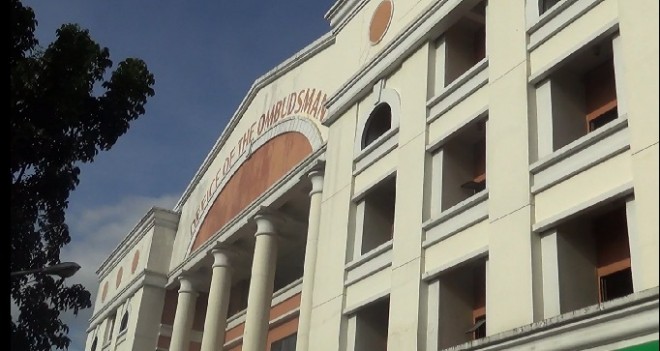Rancid dumpsites prompt Ombudsman probe of 40 Cavite local execs
The Office of the Ombudsman on Tuesday said a fact-finding investigation is underway on 40 local officials in Silang, General Trias, and Kawit for possible criminal charges in connection with the operation of open dumpsites.
In a press conference, Environmental Ombudsman Gerard Mosquera said the 40 officials in the three Cavite municipalities were part of the 50 complaints filed by the National Solid Waste Management Commission against local government units operating open dumpsites.
“The time of accountability has come. The Ombudsman is aggressively investigating complaints (for) violations of the law, particularly the maintenance of open dumpsites na walang pakundangan ng mixed garbage in an open pit, which is of course, bad for local community and has adverse health effects for the community,” said Mosquera, also a Deputy Ombudsman for Luzon.
The local officials were ordered to attend a series of clarificatory hearings on Aug. 15 and 16 at the Office of the Ombudsman, according to Atty. Myla Teologio, the focal person of the Environmental Ombudsman team and chairperson of the Ombudsman fact-finding panel.
The Ombudsman is investigating the local officials in its bid to crack down on violations of Republic Act 9003 or the Ecological Solid Waste Management Act.
Since February, the Ombudsman has started its probe of around 600 local government officials throughout the country over illegal dump sites and other violations of the solid waste management act.
READ: Ombudsman probes local gov’t execs over illegal dump sites
Mosquera said the officials may also be held liable for criminal charges of graft, violations of the Code of Conduct and Ethical Standards for Public Officials and Employees, and the Local Government Code, among others.
They also face administrative charges before the Ombudsman for gross neglect of duty that may result in their dismissal from service, forfeiture of benefits and perpetual disqualification from public office, Mosquera added.
Declining to name the names of the officials, Mosquera said the investigation covered the mayors, vice mayors, Sangguniang Bayan, and the municipal environmental and natural resources officer.
“Theoretically, one of the provisions in the anti-graft law; if the party causes undue injury to any party in government, in this case the local community, that would be a possible ground. We’re not there yet. This is still fact-finding,” Mosquera said.
According to R.A. 9003, “no dump sites shall be established and operated, nor any practice or disposal of solid waste by any person, including LGUs (local government units), which constitutes the use of open dumps for solid wastes, be allowed after the effectivity of this Act, every LGU shall convert its open dumps to controlled dumps.”
Mosquera said it’s about time the law is implemented to hold officials operating open dumpsites accountable.
READ: Ombudsman orders 90 local officials to explain illegal dump sites
“For so long, this law has not been followed. Parang optional na lang on the part of the municipalities (It’s like it’s optional on the part of the municipalities). There’s been an excuse, the lack of budget, walang ordinance, so on, so forth. But unfortunately, we have to point out to these LGUs that in the law, these are not valid defenses,” Mosquera said.
Teologio said there are three municipalities which did not respond to the Ombudsman’s invitation to explain their side – the municipalities of Ternate and Trese Martires in Cavite, and Taytay in Rizal.
The Ombudsman officials said the operation of a mixed dumpsite drew pests to the mountains of garbage, polluting nearby water ways and exposing nearby communities to health risks.
“Mabaho; parang malalim pagkalubog ng sapatos mo, basa lalo na ngayon umuulan (It smells bad; when you walk, your shoes will sink deep, and it’s especially wet now that it’s raining). Some of these dumpsites were close to bodies of water like rivers and streams. They pollute the streams and the ground water. Hindi properly managed; they affect communities. Napakalaking damage ginagawa nitong open dumpsite dun sa local community (The damage this open dumpsite has caused is huge on the local community),” Mosquera said.
“The odor really affects them. In fact, I also heard that there is another barangay in one municipality, the solid waste is already spilling over to the nearby barangay, so the nearby barangay is also complaining with regard to flies,” Teologio said.
Mosquera said the dump sites should be maintained by segregating the waste materials that could be recycled into other raw materials or reused as fertilizer.
“’Yung definition ng open dumpsite, unsegregated waste, mixed garbage. Tinatambak sa isang lugar. Ang dapat ginagawa na matagal nang sinabi ng batas, nagsesegregate tayo. Tinatabi ang recyclables; sa industry d’yan ang recyclables, nabebenta. Magkakaroon ng livelihood sa community. Second, ‘yung biodegradable ginagamit pagcompost ng pataba sa lupa,” Mosquera said.
(An open dumpsite is unsegregated waste, mixed garbage. It’s all dumped in one place. What should have been done a long time ago according to the law is to segregate. Put aside the recyclables; in the industry of recyclables, they can be sold. A community can have a livelihood. Second, the biodegradable can be used for compost.) JE/rga
